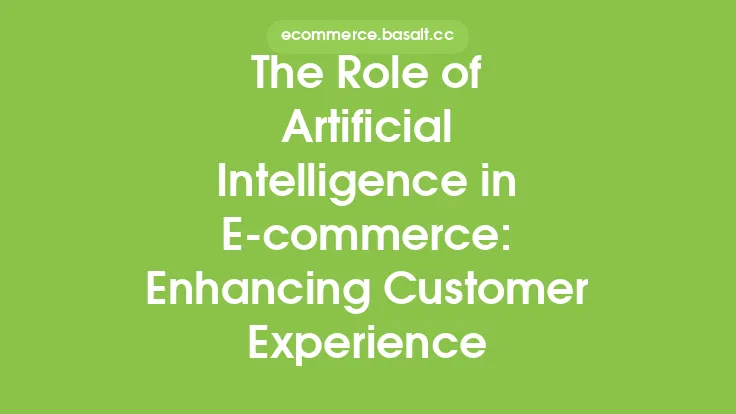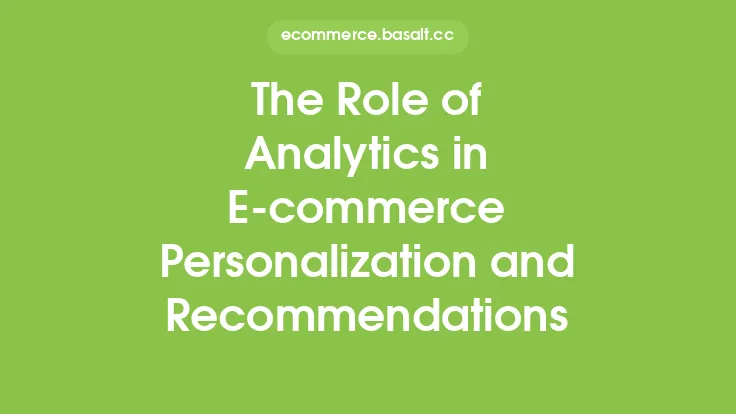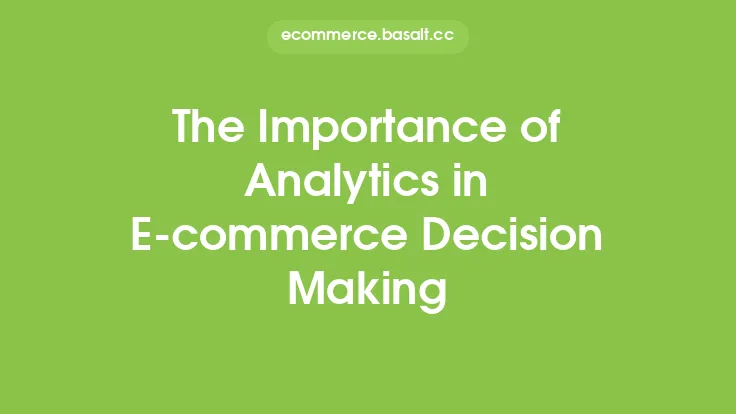In the realm of e-commerce, data is king. With the vast amounts of information generated by online transactions, customer interactions, and market trends, businesses need a way to make sense of it all. This is where business intelligence (BI) comes in – a set of processes, technologies, and tools that help organizations transform raw data into actionable insights. In the context of e-commerce analytics, BI plays a vital role in enabling companies to optimize their operations, improve customer experiences, and drive growth.
What is Business Intelligence in E-commerce?
Business intelligence in e-commerce refers to the use of data analysis, reporting, and visualization techniques to extract insights from various data sources, such as customer demographics, sales transactions, website interactions, and market trends. The goal of BI in e-commerce is to provide stakeholders with a comprehensive understanding of the business, enabling them to make informed decisions that drive revenue, profitability, and competitiveness. By leveraging BI, e-commerce companies can identify areas of improvement, optimize their supply chains, and develop targeted marketing strategies that resonate with their target audiences.
Key Components of Business Intelligence in E-commerce
Several key components comprise the business intelligence framework in e-commerce, including:
- Data Warehousing: A centralized repository that stores data from various sources, such as customer relationship management (CRM) systems, enterprise resource planning (ERP) systems, and web analytics tools.
- Data Mining: The process of discovering patterns, relationships, and insights from large datasets using statistical and mathematical techniques.
- Reporting and Visualization: The presentation of data in a clear, concise, and actionable format, using charts, graphs, and other visualizations to facilitate understanding and decision-making.
- Predictive Analytics: The use of statistical models and machine learning algorithms to forecast future trends, behaviors, and outcomes, enabling businesses to anticipate and respond to changing market conditions.
- Big Data Analytics: The analysis of large, complex datasets to uncover hidden patterns, correlations, and insights that can inform business strategy and optimize operations.
Benefits of Business Intelligence in E-commerce
The benefits of business intelligence in e-commerce are numerous and significant, including:
- Improved Decision-Making: By providing stakeholders with accurate, timely, and relevant data, BI enables informed decision-making that drives business growth and profitability.
- Enhanced Customer Experiences: BI helps e-commerce companies understand customer behavior, preferences, and pain points, enabling them to develop targeted marketing strategies and personalized experiences that drive engagement and loyalty.
- Optimized Operations: BI identifies areas of inefficiency and waste, enabling businesses to streamline their supply chains, reduce costs, and improve productivity.
- Competitive Advantage: By leveraging BI, e-commerce companies can gain a deeper understanding of their competitors, market trends, and customer needs, enabling them to develop innovative strategies that drive differentiation and growth.
- Increased Revenue: BI helps e-commerce companies identify new revenue streams, optimize pricing strategies, and develop targeted marketing campaigns that drive conversions and sales.
Best Practices for Implementing Business Intelligence in E-commerce
To get the most out of business intelligence in e-commerce, companies should follow these best practices:
- Develop a Clear Strategy: Align BI initiatives with business objectives, ensuring that data analysis and insights drive meaningful outcomes.
- Invest in the Right Tools: Select BI tools and technologies that meet the unique needs of the business, such as data warehousing, reporting, and predictive analytics.
- Build a Skilled Team: Hire professionals with expertise in data analysis, statistics, and BI, ensuring that the organization has the skills and knowledge to leverage BI effectively.
- Focus on Data Quality: Ensure that data is accurate, complete, and consistent, as poor data quality can undermine the effectiveness of BI initiatives.
- Monitor and Evaluate: Continuously monitor and evaluate BI initiatives, ensuring that they drive meaningful outcomes and inform business decision-making.
Future of Business Intelligence in E-commerce
The future of business intelligence in e-commerce is exciting and rapidly evolving, with emerging trends and technologies such as:
- Artificial Intelligence (AI): The use of AI and machine learning algorithms to analyze complex datasets, identify patterns, and predict future trends.
- Cloud Computing: The adoption of cloud-based BI solutions, enabling businesses to scale their analytics capabilities, reduce costs, and improve collaboration.
- Internet of Things (IoT): The integration of IoT data into BI frameworks, enabling businesses to analyze customer behavior, preferences, and interactions in real-time.
- Real-Time Analytics: The ability to analyze and respond to data in real-time, enabling businesses to optimize their operations, improve customer experiences, and drive growth.
- Self-Service BI: The development of self-service BI tools, enabling non-technical stakeholders to access, analyze, and visualize data, driving business agility and responsiveness.





